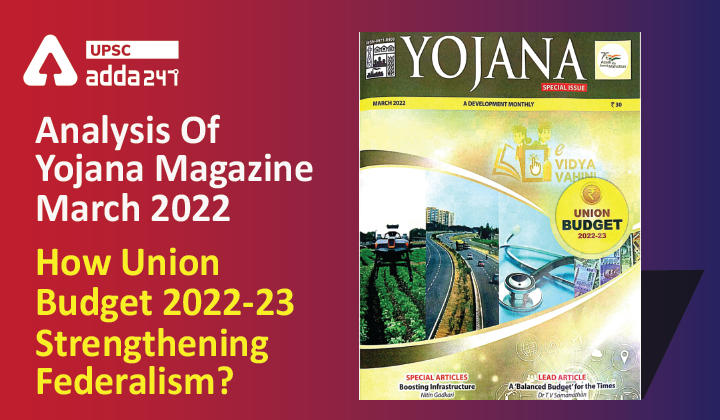Table of Contents
Analysis Of Yojana Magazine: ”How Union Budget 2022-23 Strengthening Federalism?”
Relevance
GS 2: Federalism
GS 3: Government Budgeting
Context
The Budget 2022-23 is a continuation of a series of reforms, policies and measures that have strengthened India’s federal system.
Introduction
- Cooperation and competition are the same sides of the same coin-‘Federalism’.
- Both are essential to take the New India march forward economically and socially.
- While on the one hand states need to be assisted with resources and sound policymaking guidance on the other hand they need to be encouraged to improve their performance.
NITI Aayog and cooperative federalism
- NITI Aayog has been constituted to actualise the important goal of cooperative federalism and to enable good governance in India.
- On the premise that strong states make a strong nation, NITI Aayog acts as the quintessential platform for the Government of India by bringing States together as ‘Team India’ to work towards the national development agenda.
- NITI has also established models and programmes for the development of infrastructure and to reignite and establish a private-public partnership, such as the Centre-state partnership model Development Support Services to States and Union Territories (DSSS); and the Sustainable Action for Transforming Human Capital (SATH) programme.
- The Aspirational Districts Programme of NITI Aayog(Launched in January 2018) aims to quickly and effectively transform 112 most under-developed districts across the country. The broad contours of the programme are Convergence (of Central & State Schemes), Collaboration (of Central, State level ‘Prabhari’ Officers & District Collectors), and Competition among districts through monthly delta ranking; all driven by a mass movement.
How Centre is Strengthening Fiscal Federalism?
- Centre has enhanced outlay for ‘Scheme for Financial Assistance to States for Capital Investment’: From Rs. 10,000 crore in Budget Estimates to Rs. 15,000 crore in Revised Estimates for the current year.
- Allocation of Rs. 1 lakh crore in 2022-23 to assist the states in catalysing overall investments in the economy: fifty-year interest-free loans, over and above normal borrowings.
- In 2022-23, States will be allowed a fiscal deficit of 4% of GSDP, of which 0.5% will be tied to power sector reforms. This has been done in accordance with the recommendations of the 15th Finance Commission.
Parity in National Pension Scheme Contribution
- Tax deduction limit increased from 10 per cent to 14 per cent on employer’s contribution to the NPS account of State Government employees. This Brings them at par with central government employees and would help in enhancing social security benefits.
Urban Planning Support To States
For urban capacity building, the central government will support states in implementing modernization of building bylaws, town-planning schemes, and transit-oriented development(TOD)
What is Prime Minister’s Development Initiative for North East (or PM-DevINE)
- A new scheme, Prime Minister’s Development Initiative for North East (or PM-DevINE) has been announced in Union Budget 2022-23, which will fund infrastructure in the spirit of PM Gati Shakti, and social development projects based on felt needs of the North-East.
- PM-DevINE will enable livelihood activities for youth and women by filling the gaps in various sectors, but it will not be a substitute for existing Central or State schemes.
Export Promotion
Special Economic Zones Act to be replaced with a new legislation to enable States to become partners in ‘Development of Enterprise and Service Hubs’.
Conclusion
The Budget 2022-23 is a continuation of a series of reforms, policies and measures that have strengthened India’s Federal Structure. Fiscal Federalism combined with cooperative and competitive will lead India into the post-pandemic era of rapid and equitable growth, improvement in the people’s ease of living and environmental sustainability.



 TSPSC Group 1 Question Paper 2024, Downl...
TSPSC Group 1 Question Paper 2024, Downl...
 TSPSC Group 1 Answer key 2024 Out, Downl...
TSPSC Group 1 Answer key 2024 Out, Downl...
 UPSC Prelims 2024 Question Paper, Downlo...
UPSC Prelims 2024 Question Paper, Downlo...




